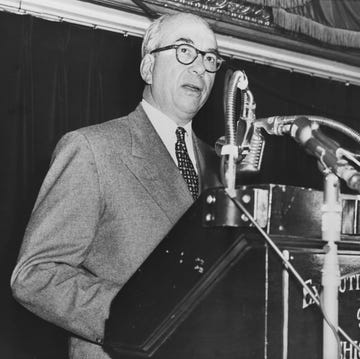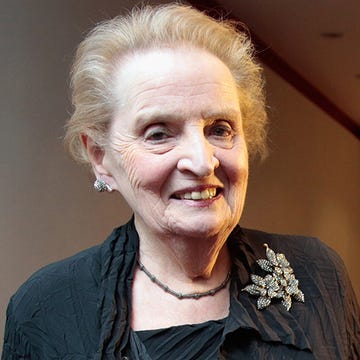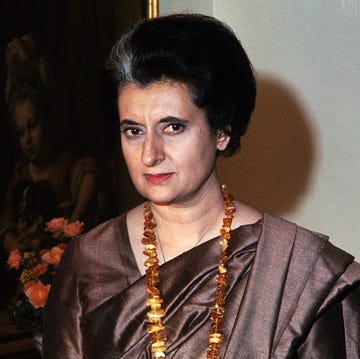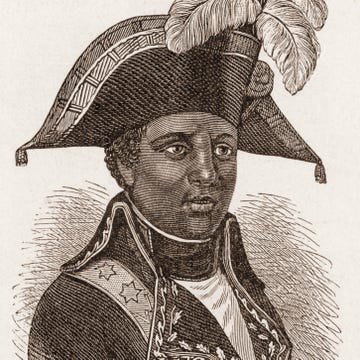(1872-1918)
Who Was Alexandra Feodorovna?
Alexandra Feodorovna (also known as Alix of Hesse, or Aleksandra Fyodorovna Romanova, among other monikers) was born on June 6, 1872, in Darmstadt, Germany. She married Russian tzar Nicholas II in 1894. Unpopular at court, she turned to mystic Grigori Rasputin for counsel after her son developed hemophilia. When Nicholas left for the WWI front, Feodorovna replaced her ministers with those favored by Rasputin. After the October Revolution in 1917, she was imprisoned and shot to death, along with her family, on the night of July 16-17, 1918. Feodorovna's rule precipitated the collapse of Russia's imperial government.
Background and Early Years
Alexandra Feodorovna was born Victoria Alix Helena Louise Beatrice on June 6, 1872, in the Grand Duchy of Hesse, in the German Empire. The sixth child of Grand Duke Louis IV and Princess Alice of the United Kingdom, she was called Alix by her family. Her mother died when she was six and she spent most of her holidays with her British cousins. She was educated by her grandmother, Queen Victoria, and later studied philosophy at Heidelberg University.
Alix met Grand Duke Nicholas Romanov, heir to the Russian throne, when she was twelve. Over the years, the acquaintance blossomed into a romance. At first, the prospect of marriage didn’t seem very promising. Nicholas’s father, Alexander III, was anti-German and Alix’s family expressed open disdain for the Russian people. Further, it was suspected she carried the hereditary disease of hemophilia, considered fatal at the time. But they were deeply in love and on November 26, 1894, the couple wed. Alix took the name Alexandra Feodorovna when she was accepted into the Russian Orthodox Church.
Marriage and Family
On the surface, the two enjoyed a warm and passionate marriage, living at Tsarskoe Selo, the private residence of the royal family. However, this tranquil life was about to be shattered by personal tragedy and cataclysmic world events.
By 1901, Alexandra’s and Nicholas’s first four children were all girls. The Romanov family needed a male heir and Alexandra desperately wanted to provide her husband a son. She turned to mystics in hopes of conceiving a boy, but to no avail. Alexandra had become so frantic that in 1903 she experienced pseudocyesis, a false pregnancy. Finally, in 1904, she gave birth to a son they named Alexei. Her joy was short-lived however as it was discovered he suffered from hemophilia.
Meeting Rasputin
Alexandra’s association with mysticism put her in contact with the notorious mystic and faith healer Grigori Rasputin in 1908. He quickly gained her confidence by seemingly “curing” the boy of hemophilia through what was believed to be a form of hypnosis. To Alexandra, Rasputin was her son’s savior, but to the Russian public he was a debauched charlatan, bringing shame to the crown and royal family.
As the saga around Alexei’s health continued, harbingers of calamity at home and abroad were also emerging. Alexandra was not warmly received by the Russian people nor the royal court, though she continued to involve herself in affairs of state. She and Nicholas were incapable of dealing with the turmoil brewing in and out of Russia.
WWI and Revolution
At the outbreak of World War I, Russia was pitted against Germany. Nicholas left for the front, taking personal command of the armed forces against the counsel of his military advisors. Alexandra, as regent, oversaw operation of the government. With Rasputin often serving as advisor, she proceeded to arbitrarily dismiss capable ministers for incompetent ones.
The poor performance by the Russian military on the battle field led to unfounded rumors that Alexandra was a German collaborator, further deepening her unpopularity with the Russian people. On December 16, 1916, Rasputin was assassinated by conspirators from the royal court. With her husband away at the front and her chief advisor murdered, Alexandra’s behavior became even more erratic. By February 1917, poor management of the government led to food shortages and famine gripped the cities. Industrial workers went on strike and people began rioting in the streets of St. Petersburg. Nicholas feared all was lost and abdicated the throne. By the spring of 1917, Russia was engaged in a full civil war, with anti-tsar Bolshevik forces led by Vladimir Lenin.
Final Days and Death
Alexandra and her children were eventually reunited with her husband and all were placed under house arrest in the Bolshevik controlled city of Yekaterinburg, at the Ipatiev House in April 1918. The family endured a nightmare of uncertainty and fear, never knowing if they would remain there, be separated or killed. During the night of July 16-17, 1918, Alexandra and her family were escorted to the basement of Ipatiev House, where they were executed by Bolsheviks, bringing an end to more than three centuries of the Romanov rule.
QUICK FACTS
- Name: Alexandra Feodorovna
- Birth Year: 1872
- Birth date: June 6, 1872
- Birth City: Darmstadt
- Birth Country: Germany
- Gender: Female
- Best Known For: Alexandra Feodorovna was consort of the Russian Czar Nicholas II. Her rule precipitated the collapse of Russia's imperial government. She was murdered, along with her entire family, in 1918.
- Industries
- World War I
- World Politics
- Astrological Sign: Gemini
- Schools
- University of Heidelburg
- Nacionalities
- German
- Death Year: 1918
- Death date: July 16, 1918
- Death City: Yekaterinburg
- Death Country: Russia
Fact Check
We strive for accuracy and fairness.If you see something that doesn't look right,contact us!
CITATION INFORMATION
- Article Title: Alexandra Feodorovna Biography
- Author: Biography.com Editors
- Website Name: The Biography.com website
- Url: https://www.biography.com/political-figures/alexandra-feodorovna
- Access Date:
- Publisher: A&E; Television Networks
- Last Updated: June 29, 2021
- Original Published Date: April 2, 2014













